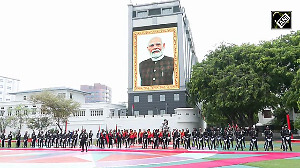Under intense questioning by lawmakers, particularly by Senators Chris Dodd and Richard Lugar, the acting Chairman and the ranking Republican of the powerful Senate Foreign Relations Committee to clear the confusion regarding President Bush's assurances of nuclear fuel supplies to India under the terms of the 123 Agreement, senior Bush Administration officials acknowledged they are only "political commitments," and not legally binding.
Coverage: Indo-US Nuclear deal
"We have been asked what would happen if India conducts a nuclear weapons test, and the short answer is that while India maintains a sovereign right to test, we most certainly maintain a sovereign right to respond," Under Secretary of State for Political Affairs William Burns told lawmakers on the Senate Panel.
Burns and acting Under Secretary for Arms Control and International Security John Rood, were testifying before a committee on the political and technical ramifications of the agreement, also said that if India tests, all bets would be off and the 123 Agreement would be terminated and besides asking for the return of all its nuclear equipment, material and fuel supplies, the US would also not encourage other countries to provide India with such fuel supplies.
"I believe the Indians understand the clarity of our position," Burns said, when asked by Dodd if the Government of India agrees that the assurances by the President as provided in the package sent to Congress vis-à-vis the 123 Agreement are "not legal but political commitments."
India engaged in illicit nuclear trade: US report
"We believe the Indian government intends to uphold the continuation of the test moratorium it committed to in 2005 and reiterated in its September 5 statement.We also believe India will uphold its safeguards agreement with the International Atomic Energy Agency. But Secretary Rice has noted clearly that we reserve the right to take appropriate action should India nonetheless resume nuclear testing and, as she told Congress in April 2006," the senior State Department official said.
N-deal critic Berman's stance crucial for Cong nod
"We have been very clear with the Indians, should India test, as it has agreed not to do, or should India in any way violate the IAEA safeguards agreements to which it would be adhering, the deal, from our point of view, would, at that point, be off," Burns pointed out.
N-deal will strengthen non-proliferation: US
The Bush administration official said that the US had sought a Nuclear Suppliers Group exception for India, consistent with the Hyde Act, and, at the same time, capable of commanding a consensus within the group.
Terming India as its fastest-growing export markets, he said it is an abiding American interest to develop a strong and forward-looking partnership with the world's largest democracy.
Don't rush N-deal vote, say Democratic lawmakers
"This civil nuclear initiative is about advancing that common strategic vision," he said, adding we need to capture that momentum, locking in the very significant gains that have been achieved in recent years. We need to establish a platform on which the next administrations in both countries can build.
'Many unanswered questions in the N-deal'
Acting Under Secretary of State for Arms Control and International Security, John Rood told lawmakers that the Bush administration believed that the civilian nuclear initiative 'will have a lasting strategic impact in building a new strategic partnership with India, reducing India's dependency on fossil fuels and resulting greenhouse gas emissions, while, at the same time, strengthening the nuclear non-proliferation regime'.
'US engaging India on a number of issues'
Rood who answered a lot of substantive and technical questions during the course of the lengthy hearing assured law makers that in the process of getting an exemption for India at the Nuclear Suppliers Group, no side deals were made.
"We achieved consensus because there was a strong desire among participating governments to find a way to enable civil nuclear cooperation trade with India, while reinforcing the global non-proliferation regime. We were able to do both," he said.
US can stop N-cooperation if India tests: Mulford
On the subject of testing and what it entailed for the United States, Rood said, "In the 123 agreement either party has the right to terminate the agreement and seek the return of any transferred materials and technology if it determines that circumstances demand such action."
Senator Chris Dodd said the fact that they were political commitments only and not legally binding troubled him because "there is still a residue of bitterness over Tarapur," where the US went back on its assurances to provide fuel supplies to India for this reactor after India conducted a test and noted, "The reason I raise this is because I am fearful that we may be setting ourselves for the same reaction on the arguments that are made in favor of going forward."
Dodd recalled that the Tarapur controversy "contributed to a generation-and-a-half of bitterness," and "we run the risk of engendering the same kind of bitterness," again because the commitments in the agreement were political and not legally binding.
Additional Reportage: PTI





